In Memoriam: Richard Hackman, a scholar who cared about government

Steve Kelman's tribute to a professor in Harvard's Psychology Department who pioneered research on managing teams.

Richard Hackman was known for research on managing teams.
Richard Hackman, a professor in the Department of Psychology at Harvard, died last week of lung cancer at the age of only 72. (He was a pipe smoker.) He was most known for his research on managing teams, a field that in many ways he pioneered. He was a major figure for many years in the academic study of organizational behavior, and in fact recently had received the lifetime achievement award of the organizational behavior division of the Academy of Management, the main organization of scholars who study organizations.
I bring up Hackman for readers of this blog because he was one of the few prominent organizational behavior scholars still around who was interested in government management. His last book, Collaborative Intelligence, was about how to make intelligence-analysis teams work better. Other work of his was empirically situated in government organizations, and pretty much all his work on teams was relevant to government. Although never on the Kennedy School faculty, he was always very warm and friendly to what we were trying to do as a school devoted to public service, and in the last years before he got sick he taught about teams to federal officials attending executive education classes with us.
I wrote two columns over the years about Hackman’s work. One, all the way back in 2002, was about his classic book Leading Teams, which in the column I called “the best book on teams I've ever read, with material that many FCW readers would find helpful.” And in 2011 I wrote a column about Collaborative Intelligence.
Hackman was associated with a number of provocative ideas, such as the idea that organizations tend to “over-team.” Working in teams takes time and energy, and some individuals may take a free ride (making the whole less than the sum of the parts). You shouldn’t form a team in the first place without good reason – usually the need to get diverse knowledge and/or skills from different people in order to solve a problem or do a task. Another view of Hackman’s was that people often pay excessive attention to team processes as opposed to how the team is structured even before it starts its work – has it been given a good task, does it have the right members, and so forth.
There was a time early in the history of organizational studies when many of the leading organization scholars (in political science or sociology departments) studied government organizations. One leading academic journal, the Administrative Science Quarterly, covered the government in about a third of its articles in its early years in the 1950s.
With the migration of organizational studies to business schools and the declining prestige of government, this has almost completely disappeared. Many organizational behavior scholars study questions that might interest any organization (government, nonprofit, or business), but few study the special management challenges of government – such as non-financial performance measurement or motivating without monetary incentives – and increasingly the trend is to study topics that are much more like individual psychology than anything having to do with organizations at all. To the extent organization scholars study a sector of society, it is business firms.
These trends are sad, though they do reflect trends in the larger society. And they make the premature loss of Richard Hackman all the sadder. Read obituary tributes to him here.
NEXT STORY: Marines seeking own IT warehouse


